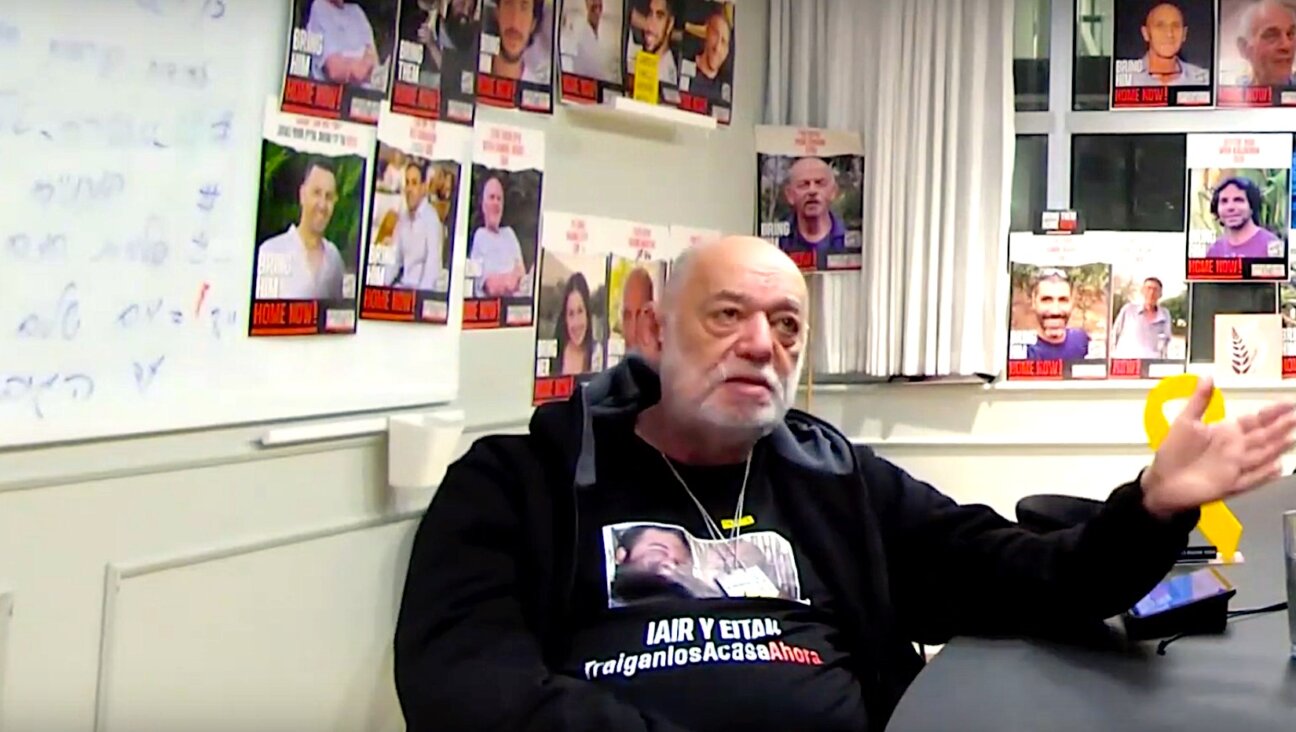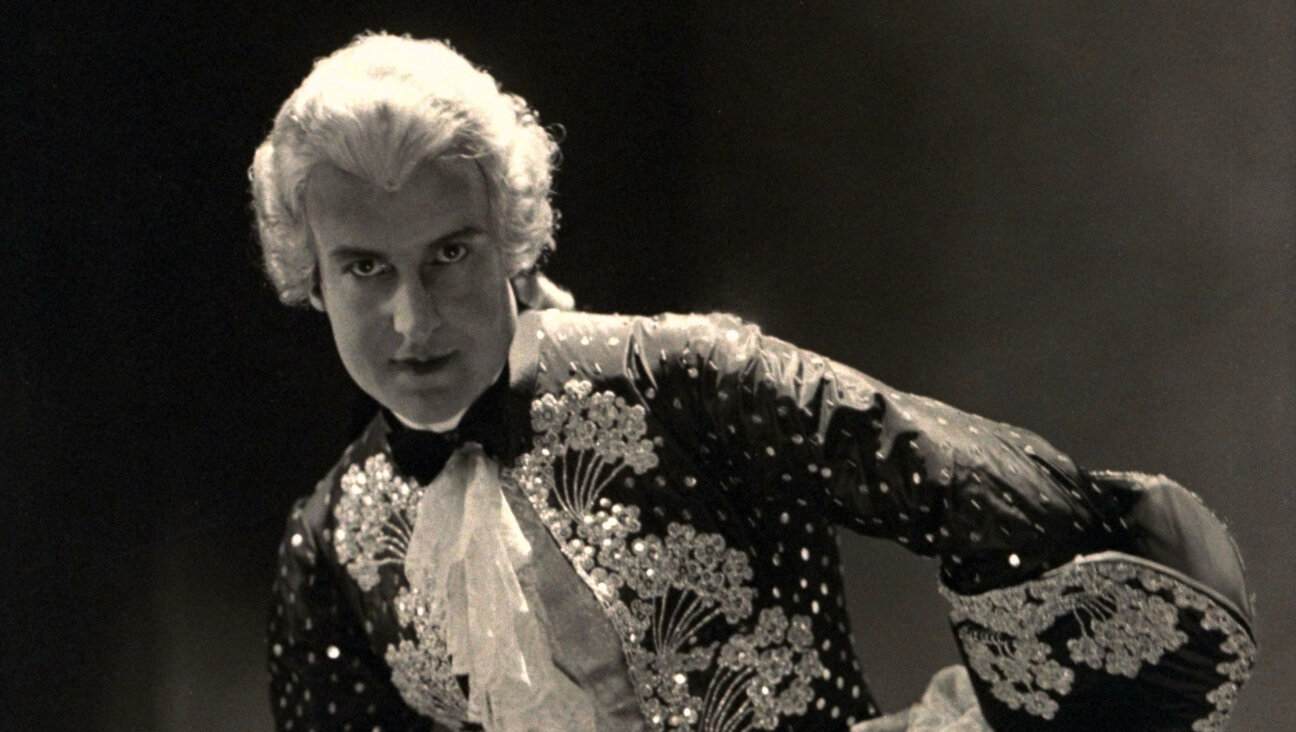A Weighty Matter Strains a Father and Son’s Close Ties
About a year ago an Israeli friend of mine called my parents’ house looking for me. “So what are you Israelis doing about the settlements?” demanded my father, a fervent believer in complete Israeli withdrawal from every last corner of the West Bank and Gaza.
“I’m not doing anything,” my friend said.
“Well, you should!” my father said, before hanging up. My friend has told this story on several occasions, always with wild shrieks of laughter. I’ve repeated the story too. It strikes me as emblematic of the edgy battle that my father and I have been engaged in over the past two and a half years.
The settlers — and Prime Minister Sharon — are a major focus of my father’s antipathy; he has nearly as much disgust for the Israeli right wing as for Hamas or Islamic Jihad suicide bombers. I am far more forgiving, and fonder of Israel. My contempt is reserved for Palestinian terrorists.
When did the fissure happen? Why did I — who had once so idealized my father and clung to his judgments — break away so fiercely over the topic of Israel? A generational difference, perhaps? A form of late rebellion? I don’t quite know.
It hasn’t ruptured our relationship in any irrevocable way. We still chat on the phone every day. We e-mail each other our articles — he’s a journalist and mystery writer (I learned to be a writer from him) — and bounce leads off each other. We have long Friday-night dinners together, and lunches with his gargoyle’s gallery of journalist pals. But when Israel comes up, the conversation changes, rapidly. Violently. It has left its mark.
As a precaution, my mother now institutes conversational bans before meals and family functions. “You cannot talk about Israel,” she says. When my father violates her ruling (he has never been able to control himself), she stares at me, hoping I will resist the impulse to answer him (I’ve never been able to control myself, either). We have argued about Israel at Passover Seders and Thanksgiving dinners, occasionally storming away from the table. We have vowed never again to speak.
To be clear: I am neither a right-winger nor religious. I have always been a vocal supporter of Ehud Barak and Amram Mitzna, and been against the proliferation of settlements, which I concede are a great barrier to peace.
And my father is not pro-Palestinian. Two years ago at the United Nations World Conference Against Racism in Durban, South Africa, when Palestinian supporters hijacked the conference and tried to make it about Israel, my father was disgusted. He has often said that Israel should destroy the Palestinian Authority and Hamas — with an iron fist, the same iron fist it should use to destroy the settlers.
But even within the parameters of our agreement, there is hopeless disagreement. I think that the bulk of my father’s current criticism of Israel comes from an unrelenting loathing of Ariel Sharon, whom he hates primarily for being fat. Sharon is rarely referred to by name; it is almost always “that fat pig.” Sharon’s girth symbolizes some character flaw that my father cannot stand — an inability to control oneself. How could a man who refuses to deny himself food be expected to deny himself a settlement?
This is not a psychological conclusion reached after careful analysis. My father is very upfront about it. Of course, he will say the requisite things about Sharon’s villainous role in Sabra and Shatilla, but more often he focuses on Sharon’s lack of dietary control.
A psychologist might ask if my defenses of Sharon have something to do with my own struggle to control my weight.
I was a chubby kid. I was never obese, but my penchant for steak and chocolate mousse was apparent, and my weight was the subject of not a few cruel jokes from both my father and mother.
Might I see in Sharon the fat Israeli inside of me?
In good faith, I once said, “Sharon’s not that fat.” When my father nearly doubled over, I added, “He’s actually quite athletic.” I had read that somewhere, although the phrase in question might have been “quite athletic for a man his size.” In the end, I don’t sympathize with Sharon because of his fatness. But perhaps my defense of the Israeli prime minister can be attributed to some deeper rift between father and son — a rift that is ongoing and eternal.
It’s probably worth noting that he and I have staked out positions unusual for our age groups.
Most American Jews in their 20s aren’t sentimental or passionate about Israel. A recent study by the Andrea and Charles Bronfman Philanthropies and others titled “Israel in the Age of Eminem,” found that Jews who remembered the miraculous victory of 1967 are sentimental about Israel. My father was 10 years old when Israel was founded, and although he spent a lifetime obsessed with Israel (I remember the bulky books he kept on his night table), he did not know any Israelis and had never been to Israel until very recently.
I, however, had an extremely personal and romantic relationship with Israel. During my senior year of college, I decided to do something “character-forming” after graduation and whimsically chose to spend a year in Israel. A few weeks after I bought my plane ticket and picked out a program, the second intifada broke out in all its fury.
And as I grew more enamored with Israeli society, made Israeli friends and felt the pain of the war more acutely, my father grew more distant. He read Tom Segev’s “One Palestine, Complete” and would call me up to praise Anthony Lewis’s columns in The New York Times.
The psychologist might also ask if my father didn’t feel resentment toward the state that had snatched the heart of his son. When we spoke on the phone (even when I was in Israel, he could never resist the urge to call me every day) and I told him stories about the people I had met and things I had done in that strange, troubled country, he was unmoved.
It was during these phone calls that we began our unending political quarrel. Before I had gone to Israel — when Barak was still at the helm — my father was sympathetic to the Israelis. But those days are long gone. “As long as those f–king settlements are there, Israel will always be in the wrong,” he has been known to shout.
There is no moral equivalence between putting up a house and setting off a bomb, I reply.
Our battle will probably continue, unabated, until the very last day of the Arab-Israeli war. If that day ever comes, I sometimes wonder, will my father and I find peace as well?
Said my father: “Not till you lose weight.”
A message from our Publisher & CEO Rachel Fishman Feddersen

I hope you appreciated this article. Before you go, I’d like to ask you to please support the Forward’s award-winning, nonprofit journalism so that we can be prepared for whatever news 2025 brings.
At a time when other newsrooms are closing or cutting back, the Forward has removed its paywall and invested additional resources to report on the ground from Israel and around the U.S. on the impact of the war, rising antisemitism and polarized discourse.
Readers like you make it all possible. Support our work by becoming a Forward Member and connect with our journalism and your community.
— Rachel Fishman Feddersen, Publisher and CEO























